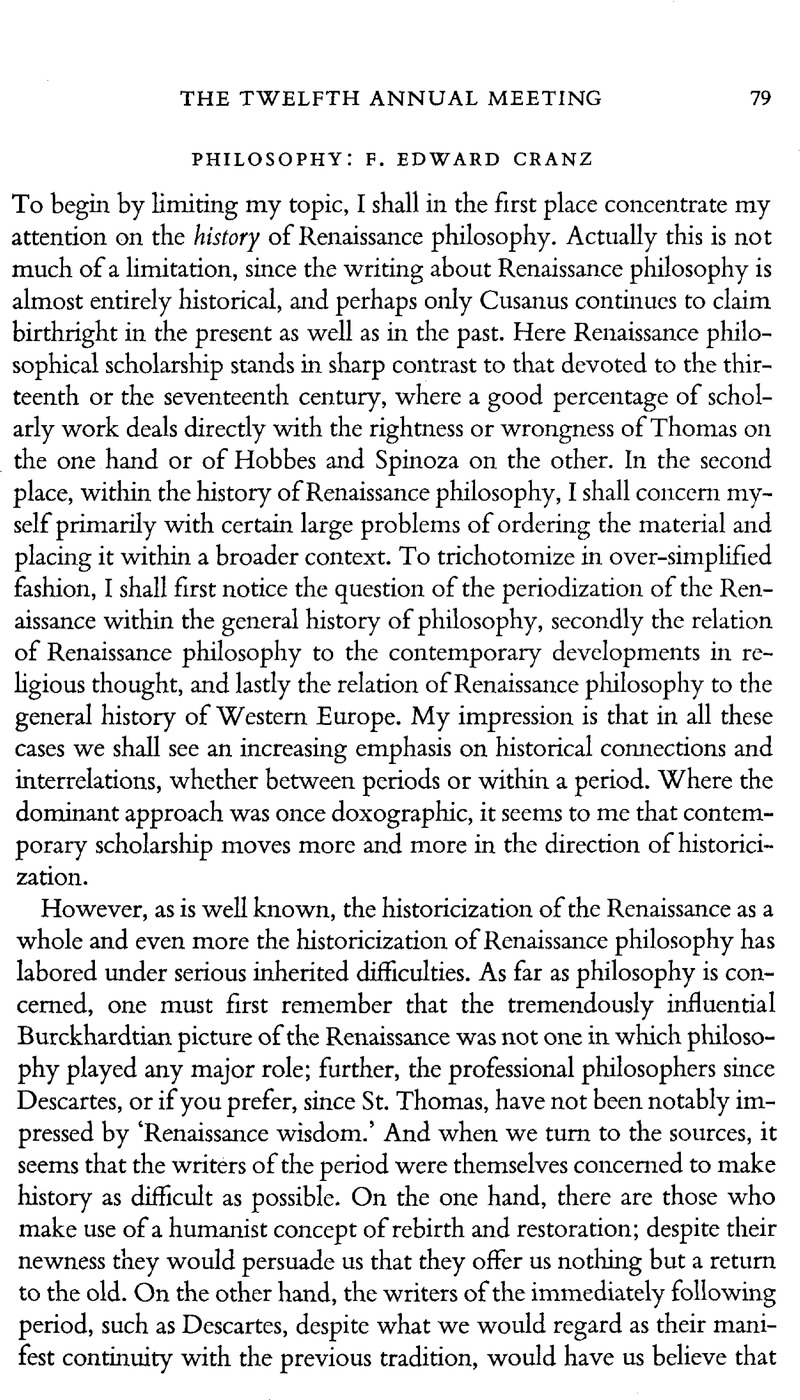No CrossRef data available.
Article contents
Philosophy
Published online by Cambridge University Press: 20 November 2018
Abstract

- Type
- Reports on Scholarship in the Renaissance
- Information
- Copyright
- Copyright © Renaissance Society of America 1966
References
1 Grande Antologia Filosqfica, ed. Sciacca, M.F., Part III. II pensiero della Rinascenza e della Riforma (Protestantesimo e Riforma Cattolica), Vols, VI-XI (Milano, 1964)Google Scholar.
2 ‘Bibliografia critica generale,’ vi, 1-87.
3 Medieval Philosophy (New York, 1962).
4 Gilson, E. and Langan, Thomas, Modem Philosophy. Descartes to Kant (New York 1963), p. ix Google Scholar.
5 The Career of Philosophy from the Middle Ages to the Enlightenment (New York, 196a), p. 123. A useful companion volume is the same author's How Philosophy Uses its Past (New York, 1963). For an important review of The Career of Philosophy ..., see Boas, George, in the Journal of the History of Ideas xxiv (1963), 287–292 Google Scholar.
6 The School of Padua and the Emergence of Modern Science (Padova, 1961), especially Chapter I, ‘The Development of Scientific Method in the School of Padua.’ Chapter I originally appeared, without the Latin texts, in the Journal of the History of Ideas 1 (1940), 177-206. For a critical review, see G. de Santillana, in Isis uv (1963), 300-302. 7 1 Band, 1500-1640 (Stuttgart-Bad Cannstatt, 1964), pp. [5], 12, 13.
8 Phibsophische Rundschau ix (1962), 81-133.
9 Ibid., p. 108. For a recent discussion of the general problem of continuity between medieval and modern science, see McMullin, E., ‘Medieval and Modern Science. Continuity or Discontinuity?’ International Philosophical Quarterly v (1965)Google Scholar, 103-129. For a defense of a Burckhardtian view of the history of science in the form of Greek origins and Western Renaissance, see Rosen, Edward, ‘Renaissance Science as seen by Burckhardt and his Successors’ in The Renaissance, ed. Helton, T. (Madison, 1961), pp. 77–103 Google Scholar.
10 Oberman, H.A. The Harvest of Medieval Theology. Gabriel Biel and Late Medieval Nominalism (Cambridge, Mass., 1963), pp. 36–46 Google Scholar, 186, 128-145. The German translation of the volume was scheduled to appear as Vol. I of three volumes under the general title, Scholastik und Reformation. For a critical review of The Harvest, see Leff, G., Journal of Ecclesiastical History xv(1964), 108–109 CrossRefGoogle Scholar.
11 Harvard Theological Review Lin (i960), 47-76.
12 For bibliographies of the recent writings on Cusanus, see the annual volumes of the Mitteilungen und Forschungsbeitr äge der Cusanus-Gesellschaft (1961-). For an account of the Brixen-Bressanone Congress, see Eckert, W.P., ‘Nicolas de Cuse a l'aube du monde moderne. Le Congres International de Bressanone,’ Revue Philosophique de Louvain LXII (1964), 651–660 Google Scholar.
13 Cassirer, E., Individuum und Kosmos in der Philosophic der Renaissance (Leipzig and Berlin, 1927), p. 7 CrossRefGoogle Scholar.
14 München, 1964. For a general review, see Wisser, R., ‘Nikolaus Cusanus im “lebendigem Spiegel” der Philosophic von Karl Jaspers,’ Zeitschrift für philosophische Forschung xix (1965), 528–540.Google Scholar
15 The Hague, 1961, pp. 7-8. For critical comment, see Bouwsma, W.J., in Renaissance News xvi (1963), 21–23 CrossRefGoogle Scholar and Spitz, L., in Archiv für Reformationsgeschichte LIV (1963), 258–259 Google Scholar.
16 Luther, ‘Disputation de homine’ (W. A. xxxnc, 1, 175). The quotation is taken from the book (p. 17) by B.A. Gerrish, cited in the text.
17 Scientific Change, ed. Crombie, A.C. (New York, 1963), pp. 272–291 Google Scholar.
18 Ibid., pp. 280 ff.
19 Ibid., p. 291.
20 For a general account of this movement, see Heer, F., Aufgang Europas (Wien, 1949)Google Scholar.
21 ‘History of Philosophy and History of Ideas,’ Journal of the History of Philosophy 11 (1964), 1-14.


